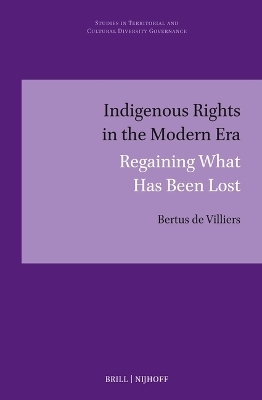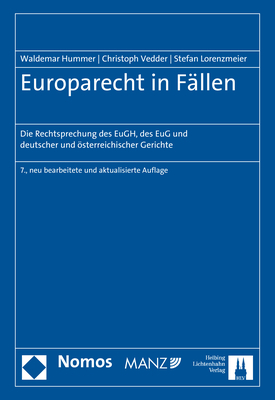
Indigenous Rights in the Modern Era
Martinus Nijhoff (Verlag)
978-90-04-54565-6 (ISBN)
Bertus de Villiers (LL.D 1989) is a Distinguished Visiting Professor at the School of Law of the University of Johannesburg. He has published extensively in the fields of indigenous and minority rights. He has given advice in several countries about the design of institutions to accommodate legal plurality, minority rights, and indigenous rights. As a legal practitioner he has represented Aboriginal communities in Australia.
Acknowledgements
1 Setting the Scene
2 Recognising Indigenous Sovereignty – Sort Of Essential Principles in International Law to Operationalise the Right to Self-determination of Indigenous Peoples
1 Background
2 The Road in International Law to Collective Rights and Self-determination for Indigenous People
3 Indigenous People: Legal Entity and Collective Rights
3.1 Australia
3.2 Nicaragua
3.3 Argentina
3.4 Kenya
3.5 South Africa
3.6 Paraguay
3.7 Botswana
3.8 India
3.9 Namibia
4 Indigenous People: Controlling Membership of a Community vis-a-vis Freedom of Association
5 Indigenous People: Meaning of Self-determination in International Law
5.1 Governance Rights
5.2 Policy Development Rights
5.3 Free, Prior and Informed Consent
5.4 Legal Processes
5.5 General Policy Participatory Rights
6 Summary
3 Right to Be Consulted, but the Frustration of Being Ignored The Ongoing Efforts in International Law to Give Practical Meaning to Free, Prior and Informed Consent
1 Introduction
2 Consultation: From International Law Theory to Practical Guidelines for Free, Prior and Informed Consent
2.1 Consultation Pursuant to ilo 169
2.2 Consultation Pursuant undrip
2.3 Standard-Setting Guidance by the Human Rights Committee; the Committee on Social, Economic and Cultural Rights; and the Committee on the Elimination of Racial Discrimination
2.3.1 Consultation Regarding Traditional Lands
2.3.2 Consultation as a Fundamental Human Right
2.3.3 Free, Prior and Informed Consent
2.3.4 Access to Traditional Lands
2.3.5 Effective Participation in Decisions that Affect Them
2.3.6 Failure to Consult Implies Discrimination
2.3.7 Legal Mechanism to Resolve Disputes
2.3.8 Right to Be Consulted When Traditional Lands Affected
2.4 Good Faith Consultation Pursuant to the “Right to Negotiate” in Australia
2.4.1 Practical Meaning of “Good Faith” Negotiations
2.4.2 Examples of Behaviour that Does Not Indicate Lack of Good Faith
2.4.3 Concluding Observations about the Right to Negotiate
2.5 Difference between “in” Consultation and “after” Consultation in South Africa
3 Concluding Observations about the Duty to Consult with Indigenous People in International Law
4 Speaking, but Does Anyone Listen? The Path of Progress and Frustration with Indigenous Advisory Bodies of the Sámi, Aboriginal People, and the Khoisan
1 Introduction
2 Australia: Why Is It So Difficult to Consult?
3 The Sámi Parliament of Finland: A “Parliament” in Name, but What about the “Obligation to Negotiate”?
4 The Khoisan: First Inhabitants of Southern Africa, but the Last in Consultancy Rights
5 Responses to the Four Questions about Indigenous Consultative Bodies
5.1 Question 1: Meaning of Consult in the Context of fpic
5.2 Question 2: Functional Areas for Consultation
5.3 Question 3: Composition of Indigenous Body
5.4 Question 4: Can Laws and Policy Decisions Be Legally Reviewed for Lack of Consultation?
5 Quotas in the Modern Era The Reserved Māori Seats in New Zealand
1 Introduction
2 Relevance of the Māori-Seats to Contemporary Constitution Drafters
3 Background of the Māori
4 Background to the Māori Reserved Seats
5 Questions Arising from the Reserved Seats
5.1 How Is the Māori Defined?
5.2 How Is the Electoral List of the Māori Reserved Seats Put Together?
5.3 How Are Disputes about Registration of Māori Voters or Candidates Resolved?
5.4 Observations Drawn from the Māori Experience
6 Summary
6 Our Land, Our Life Linking Self-determination to Land Restoration in the Case of the Makuleke Joint Management Agreement in the Kruger National Park
1 Introduction
2 International Law, Restoration of Rights to Land and Self-Determination
3 Background to Land Reform in South Africa and the Makuleke
4 Terms of the Makuleke Agreement
4.1 Setting the Scene
4.2 Status of the Land
4.3 Contractual National Park
4.4 Joint Management Board to Manage the Makuleke Region
4.5 Powers and Functions of the Joint Management Board
4.6 Responsibilities of SANParks
4.7 Transfer of Skills and Commercial Activities
4.8 Resource Use Rights
4.9 Income and Expenditure Related to the Makuleke Region
4.10 Examples of Projects by the Makuleke
4.10.1 Luxury Ecotourism Facilities
4.10.2 Anti-poaching Unit
4.10.3 General Tourism Activities outside the Kruger Park
4.10.4 Tourism Employment within the Makuleke Region
4.10.5 Concession Fees Payable to the Makuleke Community
4.10.6 Environmental Training of the Makuleke
4.10.7 Educational Standards of the Makuleke
4.10.8 Implementation Officer Employed by the Makuleke
4.10.9 Self-Governing Institutions of the Makuleke
4.10.10 Community Cohesion of the Makuleke
4.10.11 Distributing Benefits amongst the Makuleke
4.11 Resolution of Disagreements
5 Concluding Observations
7 Modernism versus Traditionalism A Reflection on the Noken Electoral System of West Papua
1 Introduction
2 Background to the Political Use of Noken
3 Noken-System: Its Cultural Meaning and Political Use
4 Constitutional Court Recognition of Noken as Substitute for Popular Vote
5 Noken-Elections: The Aftermath of the 2009-Judgement
6 Concluding Observations
8 Going It Alone Privatised, Cultural Self-Government for Afrikaners in South Africa: Insights from a Non-indigenous Community in Functional Self-Determination
1 Introduction
2 Context of Afrikaans Self-help Initiatives
3 Gauteng Education Bill-Case: The Basis for the Dogma That Funding of Equality, Trumps Funding of Diversity
4 Who Is the Afrikaans Community?
5 Opportunities for Self-Determination of Communities under the Constitution
5.1 Decentralisation to Provincial Government
5.2 Advisory Bodies – Underutilised Potential
5.3 Possible Cultural Council – Remaining Dormant
6 Language and Cultural Free Association and Parallel State-Like Structures
6.1 What, If Anything, Makes the Initiatives of the Afrikaans Community Unique?
6.2 Indicators of State Failures in Service Delivery Giving Rise to the Afrikaans Self-Do-Culture
6.3 Going It Alone: Functional Autonomy and Examples of Afrikaans Parallel State-Development
6.3.1 What is Functional Autonomy?
6.3.2 Examples of Afrikaans Functional Autonomy in Practice
7 Summary
9 Regaining What Has Been Lost The Art of the Possible
1 Theme 1: Is It Feasible to Wait for a Lazarus-Moment?
2 Theme 2: Indigenous Rights: Caught between Idealism and Pragmatism
3 Theme 3: Are Indigenous Rights “Restored” or “Granted”?
4 Theme 4: How Are Indigenous Rights Secured?
5 Theme 5: Symbioses between International Law and Municipal Law
6 Theme 6: Why Are the Rights of Indigenous People Unique?
7 Theme 7: What Is the Practical Difference between Indigenous Rights and Other Ethnocultural Minority Rights?
8 Theme 8: Can Definitional Hurdles Be Overcome?
9 Theme 9: When Does a Claim Become a Right?
10 Theme 10: Universal Rights or State-Based Bundle of Rights?
11 Theme 11: Institutional Design – a Matter for Domestic Law
12 Theme 12: Free, Prior and Informed Consent – Ongoing Search for Meaning, Content and Enforcement
13 Theme 13: Do-It-for-Me-Government or Do-It-Yourself Functional Autonomy (diy)?
Bibliography
Index
| Erscheinungsdatum | 10.07.2023 |
|---|---|
| Reihe/Serie | Studies in Territorial and Cultural Diversity Governance ; 18 |
| Sprache | englisch |
| Maße | 155 x 235 mm |
| Gewicht | 900 g |
| Themenwelt | Recht / Steuern ► EU / Internationales Recht |
| Recht / Steuern ► Öffentliches Recht ► Völkerrecht | |
| Sozialwissenschaften ► Ethnologie | |
| Sozialwissenschaften ► Soziologie | |
| ISBN-10 | 90-04-54565-4 / 9004545654 |
| ISBN-13 | 978-90-04-54565-6 / 9789004545656 |
| Zustand | Neuware |
| Haben Sie eine Frage zum Produkt? |
aus dem Bereich


